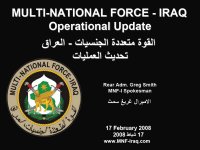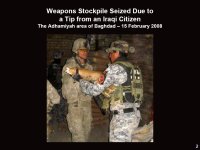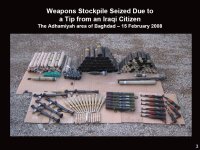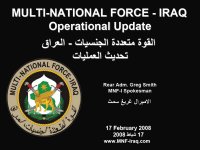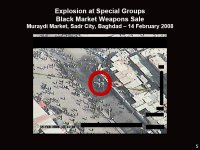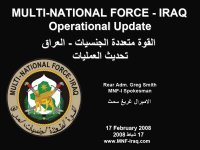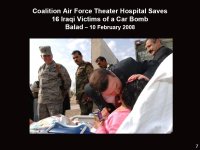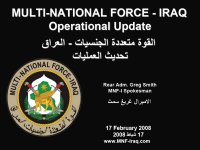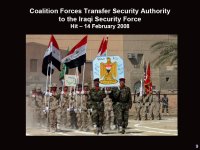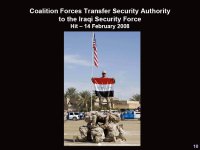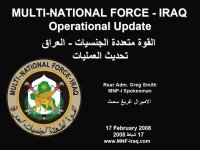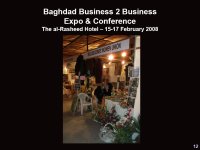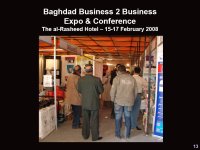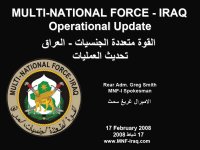
Operational Update: Rear Adm. Smith, MNF-I, Feb. 17, 2008
Multi-National Force-Iraq
Rear Adm. Gregory Smith, director of MNF-I's Communication Division, provides an operational update, Feb. 17.
PRESS CONFERENCE:
Rear Admiral Gregory Smith, Director of Communications, Deputy Spokesman, Multi-National Force – Iraq
DATE: February 17, 2008
TRANSCRIBED BY: SOS INTERNATIONAL LTD.
PARTICIPANTS:
RDML SMITH
REPORTERS:
JOHN FROM FOX
MIKE HANNAH FROM AL-JAZEERA
TINA SUSMAN FROM THE LOS ANGELES TIMES
REPORTERS 1-19
*REP1 = REPORTER 1
*INT = INTERPRETER
Good afternoon and Assalamu 'Alaikum.
I’d like to begin my discussion today by recognizing the significant parliamentary actions by the Government of Iraq and its Council of Representatives. As you know, the passage of the nation’s 2008 budget, the Amnesty Act, and the Provincial Powers Act occurred this past Wednesday. We want to extend our congratulations to the people of Iraq and their democratically elected government on these landmark pieces of legislation.
The passage of the budget for this year provides a basis for distributing resources equitably across the country and for promoting sustainable economic progress.
The Provincial Powers Act addresses the balance of power between the national and local governments. This historic law, when implemented, will allow both groups to serve the people by strengthening the power of provincial authorities and delineating the responsibilities of the central government.
We also applaud the passage of the General Amnesty Act. The ultimate success of this legislation will be achieved through careful implementation of its provisions.
Also this week, the United Nations announced that it will offer its support, and help Iraq organize the provincial elections called for in the Provincial Powers Act to occur this October.
The improving security situation is helping to create an environment for progress.
This week, the government of Iraq marked the one year anniversary of Operation Fardh al-Qanoon – Operation Imposing the Law. The purpose of Operation Fardh al Qanoon has been to improve the security conditions under a principle of the rule of law … to build a civil society that provides protection, services and hope for the future.
Fardh al-Qanoon has been a joint operation since its inception. As Coalition forces surged five reinforcing combat brigades into the Baghdad area, the Iraqi Security Force conducted a surge of their own. The Iraqis recruited and trained over 125,000 additional soldiers and police officers in 2007. They trained specialized units to face unique challenges presented by the terrorists in the populated areas.
Together, they established local security stations to build confidence in neighborhoods, confidence that would lead to greater cooperation from local citizens and greater success at uprooting extremism and deterring violence. A year ago, there were an average of 205 terrorist attacks each day across Iraq. In June, these numbers peaked at an average of 210 attacks per day, just as the last of the coalition reinforcing brigades were getting into place, and as the Iraqi Security Forces were beginning their surge.
Last month, we tracked 82 attacks a day, a decrease of over 60%. And recently, we have experienced some days where the total number of attacks across the country dropped below 40, the lowest levels seen since 2004. In Baghdad under Operation Fardh al-Qanoon, this decrease has even been more dramatic. The city’s residents were suffering an average of 28 terrorist attacks a day in February 2007.
Attacks peaked at 46 in June 2007. Last month, there were 11 attacks per day, down more than 60% over the year and off 76% from peak levels. Of course, each attack represents an attempt by terrorists to kill and spread instability. They are reminders that although the enemies of the people of Iraq are weakened, they still can recruit and conduct spectacular attacks. Iraqis are indeed rejecting these terrorists, and the Iraqi Security Forces are continuing to build its capabilities. But stability will take time and a continued commitment by all.
With the help of the Iraqi citizens and the Iraqi Security Forces, we are taking more weapons and munitions out of the hands of terrorists. Last month, Iraqi and coalition forces seized 836 caches. This is the highest total since the start of Operation Fardh al-Qanoon, and it means the terrorists have less explosive material available to wreak havoc. Regrettably, there are still too many weapons in the hands of the enemies. Coalition forces are making progress, but there’s still much to do in this area.
Last Tuesday, an Iraqi police unit was on the job investigating a possible improvised explosive device when they were ambushed by small arms from a group of al-Qaida terrorists. The Iraqi police responded bravely and with lethal fire power. They swept the ambush site and killed seven of the al-Qaida attackers. They also arrested 16 others. Regrettably, one police officer was killed. Operations like this are not just disrupting current terrorist operations, many of them are leading to significant seizures of deadly arms and explosives.
In just the past week, Iraqi and coalition forces captured 212 weapons caches across Iraq, two of those coming from here inside Baghdad, with growing links to the Iranian-backed special groups. On Wednesday, coalition force soldiers from the 2nd Stryker Brigade Combat Team operating northwest of Baghdad captured a significant stockpile of weapons: nearly 200 mortar rounds, 425 anti-aircraft rounds, over 8,000 rounds of 30- and 50-caliber ammunition, 40 pounds of TNT, 60 pounds of high explosives, and several other weapons and munitions.
On Friday, coalition forces made another substantial seizure of weapons and ammunition, this time due to a tip from a local citizen. Again, acting on information supplied from a resident in Baghdad, soldiers from the 2nd Brigade Combat Team discovered and secured 120 mortar rounds, 33 107-mm rockets, 500 rounds of anti-aircraft ammunition, 50 rocket sleds and associated components, 30 hand grenades, and again, several other munitions along with a dozen automatic rifles. These deadly weapons were captured in the Adhamiyah neighborhood.
They were ready to be used. They had the potential to kill and wound several innocent civilian men, women, and children. Thanks to a tip from a concerned citizen they have been removed from the streets of Baghdad. We also saw over this week evidence of just how dangerous explosives can be in the hands of special group criminal. On the afternoon of February 14th, there was an explosion in an open air market in Sadr City. The explosion killed two Iraqis and wounded 24 others. In this reporting by the Iraqi Security Forces that responded to the blast suggested that it may have been caused by a car bomb or perhaps a suicide vest.
Further investigation revealed this explosion was caused by the accidental detonation of explosives that were being sold out of a car in the Muraydi market. The munitions were sold on the black market by two special groups’ criminals. If their sales had been successful, who knows how many might have died. In this case, it appears the only fatalities were the two criminals trying to sell the explosives. But 24 others were injured. While coalition forces continue to work with Iraqis to improve security, we cannot stop all the violence.
Sometimes, all we can do is help repair the damage and care for the injured. On February 10th, 20 Iraqi men, women, and children were gravely wounded by a car bomb about five miles east of Balad and were airlifted to the Air Force Theater Hospital by coalition force soldiers. The victims, including two children, were suffering from a number of serious injuries, including head wounds, shrapnel, and severe burns. Four of the most grievously wounded Iraqis did not make it through the night, their first night in the hospital. But after more than 77 combined hours of surgery, 16 victims did survive the ordeal. The 3rd Iraqi Army colonel expressed his thanks. He said, “Coalition forces are like angels. The doctors and the nurses saved not only our people but also our culture.”
Today, all but seven of the victims have been released, and those seven Iraqis are expected to make a full recovery. In another sign of cooperation between Iraqi and coalition security forces, this Friday, Iraqis assumed security authority for the town of Hit. Hit was once a violence city, torn by fighting occurring across too much of the Anbar province. This week, Anbar governor Mamoun Sami Rasheed resided over ceremonious speeches, songs, poetry, and marching, as he’d became the second city in Anbar to transfer Iraqis security control since December. Throughout Anbar, security has improved as the local citizens have decided to reject al-Qaida.
A province that was once considered lost by some observers has instead become a model of Iraqi cooperation. I started today’s discussion with you by noting political gains that were made possible by securing progress through security. I’d like to close my remarks by touching on a few signs of economic progress. The first successful staging of the Baghdad business expo and conference was held at capital city here at the al-Rasheed Hotel. The event was hosted by the Baghdad Chamber of Commerce and supported by the US Chamber of Commerce.
Over the past three days, exhibitors from Iraq’s banks, hotels, trade unions, business associations, and state-owned enterprises showed what they had to offer in 260 booths, which more than 8,000 interested executives, entrepreneurs, salesmen, investors, and trades people attended. The event was organized by Iraqis for Iraqis, and was designed to promote commerce and cooperation across the country. It made for quite a scene, one which we hope will be repeated many times across Iraq in the months ahead. The growth in business that we all hope to see depends on the restoration and expansion of essential services across Iraq.
This is an ongoing and vitally important process. In the past, infrastructure had been neglected and essential services were not fairly distributed across Iraq. Yet, some areas are fighting back and making progress one day at a time. After a dedicated effort by the local citizens, their government, and coalition partners, there is a renaissance underway in Arab Jabour. The expanded availability of electricity, coupled with the installation and maintenance of a network of operational street lights, has allowed a restoration—even a considerable improvement—in business and commerce in the area. Shops are open later. Families walk the streets, and sales have increased for merchants. This is again a prime example of security leading to help opportunity and economic development.
This is indeed a country blessed with many gifts, both the natural resources and an incredible human capital. The economic development spurred on by improved security is beginning to open doors to a brighter future, and the coalition is proud to be a partner. And with that I’d be happy to take your questions. Front row please.
JOHN: Admiral, John with Fox. Did you say that you were seeing a growing link to Iran in terms of the weapons caches have been seized recently? And does that sort of represent a change from what we were hearing earlier, which was that Iran had in fact sort of decreased the amount of weaponry sent in? Who are they sending to? What sort of weapons are you finding from Iran?
RDML SMITH: What we’re seeing is an increase, I think, in the use of weapons by special groups, Iranian-backed special groups. Many of these caches have been in Iraq for some time now. And through, I guess, the vigilance of both our operations and that of the tips by local citizens, we’re uncovering more and more of these caches. What’s significant is that there are still attacks occurring daily by Iranian-backed special groups against coalition and Iraqi Security Forces. And the more of these munitions we take off the street the better. In the case of the black market sales, clearly there was an ongoing act of attempt by at least two criminal members of special groups to try to sell some of this munitions, again, on the black market. In that particular event, the vehicle itself they were selling out of blew up, killing the two that were selling munitions and injuring 24 others. In the other instance though, we’ve got munitions that are being found, again through citizen tips, that would otherwise be used by these special groups. So I don’t want to give you the impression that we’re seeing an increase in the shipment of arms by Iran into Iraq, but we do believe that the Iranian-backed special group members who have received training and financing continue to operate here in Iraq, and would use these caches to, again, conduct their operations.
REP1: (Unintelligible), London Times. How worried are you about the al-Sahwah in Jurf al-Sakhr who have halted their work in protest at three of their members being killed in what they say is an American attack? And also, are you concerned that other al-Sahwah, about other al-Sahwah who have expressed fears that they’ve been targeted as well, or they’ve been hit accidentally by American forces? Thanks.
RDML SMITH: This is a very challenging environment, as you all know. And often our operations are conducted in close proximity to, in this case, Concerned Local Citizen groups that are operating to provide security. They are often, again, used by the enemies, civilians as human shields. In these instances though, we have operations in which Concerned Local Citizens were certainly not targeted by coalition forces, but have become part of an operation which they were injured or killed. In a couple cases, though, we do know that our forces were receiving fire from a group of individuals on the ground. We returned the fire, and later determined that some of those individuals were, in fact, Concerned Local Citizens. We won’t know in any instance until we certainly do a thorough investigation what motivated the firing by these individuals from the ground. In this case, one case was against helicopters. So you’ve got to work through each of those situations to fully understand. But to be certain, coalition forces are partnering with Concerned Local Citizens to bring about security. They certainly are not targeting Concerned Local Citizens. I’d understand and completely sympathize with the plight of all Iraqis who are caught in this violence that’s spiraled out of control with the terrorist groups in Iraq. But with their support, we’re beginning to bring those levels of violence down. Unfortunately, on some days and some nights, that also involves individuals being caught up in that, both civilians and Concerned Local Citizens. And we’ll work our way through these two incidents to make sure we understand them fully. Yes, sir.
HANNAH: Admiral, Mike Hannah from al-Jazeera. You mentioned in one of those incidents a tip-off from a Concerned Local. Are you finding that this happening more as your intelligence gathering on the ground getting more efficient because of greater local participation?
RDML SMITH: One of the really key components of the change in the last year has been the decision by local Iraqis to participate in their own security. Some are doing it by being Concerned Local Citizens. Others are simply doing it by providing information, both to ground Iraqi forces and our own forces. As the location of munitions and sometimes the location of al-Qaida and other extremist members themselves. There has been a significant change in that component in a positive direction. More and more tips are coming in from these individuals. It often, though, takes a bit of time as we work our way into an area where there had not been a presence of coalition forces or Iraqi Security Forces, where the only thing they know was the violence of al-Qaida or other extremist groups. But over time, as relationships are developed and built, people begin to trust and have the confidence in security forces that they are going to stay. And that leads to even more and more information being provided. So yes, it’s been a very positive constructive change over the last year. Sir.
REP2: The joint forces now preparing for a big operation or a military operation in al-Mosul to fight al-Qaida. Don’t you think that declaring that you’ll do such a thing in al-Mosul give the insurgents the opportunity for organize them or maybe escape from this area?
RDML SMITH: I think we made it pretty clear to all of Iraq’s enemies that we’re going to find them no matter where they operate inside of Iraq. I don’t know that we’ve made any specific announcements that would suggest when any operations will begin or the scale of those operations. We’ve been, for instance, in Mosul for several years now operating, and the conduct of those operations will continue. If there’s an increase in the intensity and the pace, it will come at a time of our choosing. And the enemies, if they choose to stay and fight, will be dealt with. The goal here, of course, is to remove violence from the population centers to give the people of these larger cities especially an opportunity to rebuild and to get back to some normalcy. Unfortunately, the enemy has a vote here. And their choices they make as to where they want to stay and fight will be theirs to make. But I guarantee you that our acknowledgement of our intent of going after the enemy is in no way, we think, going to compromise our ability to conduct those operations. And we certainly would never do anything to put our forces at risk. Yes, sir.
REP3: Asking question in Arabic.
INT: Question from al-Meddah newspaper. According to our sources, the general amnesty included an article that urges the American forces to take care of their detainees or move the detainees from the American detention facilities to the Iraqi ones. What’s your opinion about this?
RDML SMITH: There are approximately 24,000 or so Iraqis in detention today in coalition force detention facilities. Last year alone, more than 8,000 of those individuals were returned back to neighborhoods. Just this past week, another 300 were returned home. These individuals that have been moved out of detention facilities have been done so over the course of a program that involves not only their recognition by a joint panel of Iraqi and coalition members of their no longer being a threat to Iraqi security, but also they’ve gone through a program of training and education and pledging support to both the Iraqi government through a pledge of honor to a judge, as well as a member of their community. I don’t know specifically in the Amnesty Act what it calls for relative to the coalition detainees. But we have had a program that has involved not amnesty, but recognition that those that have made a mistake, have made an error, who no longer are threat or pose a threat to Iraq and have gone through this program of reintegration, are being allowed to go back home. Yes, sir.
REP4: Asking question in Arabic.
INT: Question from the Iraqi Free Radio. The Iraqi government, and you said that there’s a huge improvement in security ever since Operation Fardh al-Qanoon started. Do you think that there is no need to the presence of the five brigades brought during the surge?
RDML SMITH: I think just the opposite. I think we’re…in terms of the presence of forces in Iraq, there’s a need to continue presence there for the coming foreseeable future. There is a drawdown of five brigades of the 20 brigades that were brought in as the surge. And that will take place or end in the July timeframe. The level of forces inside Baghdad or elsewhere will be really commensurate with the risk associated with security. Although there have been improvements, Baghdad is a very large, very complex security environment. And we’ve made considerable progress, but that progress will require, still, a certain level of forces in Baghdad for the foreseeable future partnering with the Iraqis. Yes, ma’am.
SUSMAN: Thank you. Tina Susman from the Los Angeles Times. Back to what you said was the apparently increased use of weapons by Iranian-backed groups, to what do you attribute this? Do you think that there are orders coming from the leadership in Iran? And are you at all concerned that part of this could be due to perhaps former Mahdi army members getting fed up with the Sadr ceasefire and deciding to join these special groups?
RDML SMITH: Well, the ceasefire definitely that Muqtada al-Sadr has put in to place since August has been very constructive. It has somewhat divided and made it much clearer as to those that are willing to move forward in a peaceful way in terms of Iraq’s future and those that want to pursue violence. The Iranian-backed special groups in particular are volatile in the sense that they receive specific training inside of Iran. Iraqis go to Iran, receive the training, and return back to Iraq and participate as both training other individuals in the conduct of those same skills, but also organizing to conduct operations. The special groups’ activity has not decreased in recent months. They continue to be probably the most violent of the extremist groups that we’re seeing from Shia sects. But the intent of Iran in supporting the training and financing we believe continues. What we don’t know precisely is whether or not there’s any direction coming from Iran as to how they conduct their operations inside of Iraq. We do think that the training and financing of those activities remain in place.
REP5: Asking question in Arabic.
INT: Question from Radio Sawah. In Diyala province, the Awakening Groups rebelled and decided not to fight al-Qaida anymore. Don’t you think this threatens the future of the other armed groups that joined the Awakenings and gives a sign that they are rejecting the government there?
RDML SMITH: Well, what I think we’re seeing in Diyala, again, is an expression of democracy in play, and that is that members of these Concerned Local Citizen groups have an issue with, in this case, the police chief. And they’re addressing those issues vocally, and they’re talking about it, and they’re sitting down and having discussions. It has not turned into violence. It has not turned into taking up arms against the government. In fact, it’s men sitting down and having a discussion about their grievances. That’s I think a healthy process. And so, no, we’re not concerned necessarily that this is a sign of any potential shift in the support of Awakening members, but in fact just represents, I think, a maturity and the growth of this democracy. Yes, sir, in the back.
REP6: Asking question in Arabic.
INT: Question from an Italian news agency. There are some talks with, American talks with the Turkish government to eliminate the activities of the PKK. Could you give us some details about these talks between the Americans and the Turkish regarding the PPK?
RDML SMITH: I don’t have any current updates for you, if you’re referring to any recent discussions. But historically, as you know, the US has partnered with Turkey, Iraq, and other members of the region to address the concern of the PKK as a terrorist group. Those talks, I think again, are designed to drive a diplomatic solution to the outcome of what to do about PKK and northern Iraq. Turkey continues to express their concerns, rightfully so, that PPK poses a threat to Turkey, and are dealing with those issues as they see necessary, both military and through non-military means. Our discussions with Turkey have been very open and frank. And as far as Multinational Force – Iraq is concerned, we’re not part of that direct dialogue, so I can’t provide you the details on that.
REP1: Sorry to ask another al-Sahwah question. Some of the al-Sahwah that we’ve spoken to have said that they, because of the mistakes that have been happened, they’re becoming really nervous and they would like some reassurances from the Americans that they’re working with that more is going to be done to ensure that things like what happened in the village [unintelligible] don’t happen again. Are you reassessing your policies to, you know, to make sure these sort of mistakes don’t happen?
RDML SMITH: Again, it’s a very, very complex environment out there. And you’ve all reported on just how difficult it is to work your way through a complex situation that’s involving the exchange of gun fire. Concerned Local Citizen groups have a responsibility to work in their sectors and conduct their operations in accordance with the agreements that have been laid out by both the Iraqi and coalition partners that work in the area. Again, in some situations, we are dealing with our operations targeting known extremist groups. In this case, some cases al-Qaida. Those targets, those objectives are being moved on by our forces, and then suddenly, we become under fire by an unknown group of individuals that either come from buildings or nearby, resulting in our return of fire. When it’s all said and done, you obviously want to determine who those individuals were. In some instances, they’ve turned out that they’ve been Concerned Local Citizens. What’s unknown to us is precisely—at the time, anyway—is precisely what they thought they were shooting at or who they thought we were shooting at. I would suggest that anything that’s helicopter-borne, I would necessarily suggest it’s coming from the coalition. Ground forces might be much more difficult to determine. So, without pointing blame or suggesting that we’re always in the right in terms of operations, we certainly conduct our operations to be precise as we can. But again, in the conduct of the operations as individuals get caught up in the exchange of gun fire, it becomes more difficult to sort that out until it’s all over. And so our change of our tactics, it wouldn’t necessarily be what we’d want to discuss from here. But we certainly would want to suggest to you that we do not target Concerned Local Citizens at any time, and certainly would not do that.
REP1: So, you’re saying that the Concerned Local Citizens who were killed on Tuesday were shooting at the helicopters…they were actually being aggressive.
RDML SMITH: There has been aggressive conduct by members of armed groups, and whether or not they are Concerned Local Citizens who are also associated with an armed group, those are the kinds of these we want to work our way through. It’s clear that there are extremist groups that are penetrated some of the Concerned Local Citizens, that there may be in fact al-Qaida amongst the Concerned Local Citizens. We also know that al-Qaida would like nothing more than to aggravate the situation. So there’s a lot to be learned from these particular instances. But I certainly do not want to leave you with the impression that the coalition forces or the Iraqis would knowingly go out and target the Concerned Local Citizens. If we know precisely where they’re at, if they’re operating in the areas that are prescribed to be in, that makes our job much easier to sort of de-conflict the battle space. But when it gets mixed in together, and it’s 4:00 o’clock in the morning and people are firing at you, you’re going to fire back in self-defense.
REP7: Following that same train, what about actually the equipment that the Concerned Local Citizens are supposed to have and wear? Some of the ones we’ve spoken to have complained that there’s not enough of these reflective belts or vests to go around. And with the number obviously still growing – I think the latest estimate is about 80,000 – is there enough of this equipment? Have you heard these complaints that they don’t all have the equipment they’re supposed to be wearing, hence making it a lot easier to be mistaken for enemies, especially in the dark?
RDML SMITH: I have never heard that there’s an unavailability of equipment. We certainly have heard cases where people are not wearing their prescribed uniforms and equipment to make them more readily identifiable. But I have not heard the complaint that they are not being supplied with sufficient numbers.
REP8: Yes, I’m [unintelligible]. What about your plans to speed the reconstruction operations? Because the public opinion accuse you that the coalition forces is part of delay of reconstruction for the infrastructure in this country, like the power or water. What do you say about that?
RDML SMITH: Again, the frustration by the Iraqi people is understandable, but I would suggest that both the coalition and the Iraqi government is doing absolutely everything it can to begin the rebuilding process here in Iraq. In many cases, continue the level of work. In the case of electricity, for instance, there’s been a $4 billion investment to date in electrical power generation. That’s a significant investment by, in this case, the US. There’s been hundreds and hundreds of schools that have been rebuilt or refurnished, refurbished. There has been regeneration of the water capacity, both in the treatment and the movement of water, sewage systems. So I think that work is ongoing at a pace that’s both achievable given the security environment, and with the level of contract support, skilled work force, and available funds. But 2008 will see more improvements, and so I think the patience of Iraqis is understandable, the impatience. But please be sure that you understand that there is considerable effort ongoing, and we’ve briefed many of these projects here from this podium in the past months. Sir.
REP9: Talks were supposed to take place last week, I think, between the Ambassadors of the US and Iran, and that’s not happened. Any indication, as far as you know, on why that is not happening? And will it be happening any time soon?
RDML SMITH: My understanding is that the Iranians have chosen not to conduct the talks at this time. Those talks are done, as you know, at the invitation of the Iraqis, and we were informed through our Iraqi counterparts that the Iranians had said they were no longer prepared to meet and would reschedule those talks at a later date. So there’s been no update since then. Sir.
REP10: Asking question in Arabic.
INT: Question also regarding the American-Iranian talks over Iraq. Do you think the United Nations, or the American administration intends to reveal all the Iranian part of, the Iranian involvement in supporting the militias in Iraq? Will they talk about this in the discussions?
RDML SMITH: That’s a very good question. We have been as transparent as we can up here publicly with you regarding Iran’s malign influence in Iraq over the years. And I would suggest that we’ll be equally transparent in our discussions with Iran if and when those talks take place. Yes, ma’am.
REP11: Asking question in Arabic.
INT: Question from al-Babailiyah. Is there any intention to integrate the Awakenings to the Iraqi army? Or do you intend to separate them?
RDML SMITH: No, in fact, the program all along has been designed to allow those who want to have a long term employment with the Iraq Security Force to do so. In fact, over 7,000 of the Awakening members, Concerned Local Citizens have already migrated into the process of being reviewed in terms of their records. And in the process of them going into a training program for the police or the army, several thousand have already done that, in fact, have gone through the full training and have become police officers or army, with several, several thousand more in the queue. What we have is a process that allows for individuals to once they have wanted to participate as a uniform member of the police or army and then have a board that meets that reviews those individuals, and then they get put into the process of waiting for a training slot to open up. The school houses that produce police officers and army obviously have a limitation in the numbers they can go through. But there already has been several thousand transitioning into that program, and will continue to do so in the future.
REP12: Admiral, you said earlier that there were in this time of the freeze, that these special operations groups have not decreased their activities. Other than the Sadr City explosion the other week, what are some of the activities that you attribute to these groups? What have they been doing in the last few months?
RDML SMITH: Well, if you consider the number of improvised explosive devices, the explosively-formed projectiles, those are all attributable in many cases to the special groups having laid those devices out there to kill, in most cases, coalition and Iraqi Security Forces. And their targets against both US and the Iraqis in terms of security has been very, very significant over the last several months. And that has not changed at all.
REP12: So IEDs and EFPs around Baghdad but…
RDML SMITH: Well all around Iraq. That’s right. Yes, sir.
REP12: And then the various suicide vest attacks?
RDML SMITH: That’s right. Well, suicide vest attacks principally have been al-Qaida. Special groups are using more the improvised explosive device – the EFPs being the principal among those – mortar fires, rocket fire. Those two caches you found there, had they been employed, 50 rocket sleds, over several hundred rockets available right here in Baghdad. That’s very, very significant.
REP12: And that’s been attributed to the special groups?
RDML SMITH: That’s right. That’s right.
REP1: I’m really sorry. Can I just clarify the 4:00 AM incident that you talked about of the helicopter being shot at, that was the Jurf al-Sakhr. And then you mentioned a second incident as well. When and where did that take place and what happened?
RDML SMITH: Well there was an event in the recent days up near west of Kirkuk. All right. Okay. And that event, again, we’ve got in a very confused situation in which MI had reported two separate events. In fact there was only one. A group of individuals that were being targeted, al-Qaida in this case, our group, our forces as they went in to take on that objective were fired upon. In the course of that entire exchange of gunfire, there were six Iraqi, al-Qaida…I’m sorry six terrorists that were killed, four men, two women. All were involved in exchanging gunfire. An additional twelve that were detained. Among that group were nine CLC members. And they have been released back as of today. In amongst the killed were some CLC members. So a very…at this point, we’re working our way through to understand what their role was in that particular exchange of fire.
REP13: I’m sorry, the…oh. In the [unintelligible] incident, you were saying there were six terrorists killed but there were some CLC members killed. Could you just go through sort of the numbers again and who was killed?
RDML SMITH: Sure. All total, there were six that were killed that were killed in that exchange of fire – four men, two women. I don’t have a precise number among the six killed that were identified as CLC. We believe several were though. Those that were detained, nine of the twelve were released, including the Awakening member leader and eight of his other CLC members. And then three remain in detention.
REP14: Does that mean that the CLCs that were killed were, like, corrupt CLCs?
RDML SMITH: We don’t know that. All we know is they were firing on our forces, and they were killed as a part of that exchange of gunfire.
REP14: And that’s the same for three that were killed in [uintelligible]?
RDML SMITH: Again, we don’t know. That’s right. We’re working out way through that.
REP14: So you don’t know that they were CLCs?
RDML SMITH: Right, we do know that. Yes, ma’am.
REP15: Asking question in Arabic.
INT: Question from a Parliament newspaper. There are some Awakening groups. How could you, or how could coalition forces distinguish between the bad Awakenings or eliminate them? Because the Awakenings are actually being infiltrated right now.
RDML SMITH: I think it’s important as you sort of stated the question, we don’t think there’s actually groups of individuals that are bad. There are individuals among the groups that clearly, perhaps, do not have the same interest that their leadership does, and that’s providing peace and security. And if they’ve been infiltrated by al-Qaida or other extremist groups, they need to be weeded out, and have been over time in many, many instances. I think the best course of that to occur is by the leadership itself of that Concerned Local Citizen group policing its own membership. And as individuals are identified, they have been removed from the groups. We don’t know, again, in these instances what we have involved here. But to answer your question specifically, we don’t think there are Concerned Local Citizen groups in terms of a complete unit that’s bad. But there may in fact be individuals that, again, need to be dealt with and be removed. Sir.
REP16: I just wanted to ask you, too, on there was an incident, I think, in Thursday in Shirqat or [unintelligible], northern Saladin province, where the police said there were CLC people killed. And I think the military said they were.
RDML SMITH: That’s the incident we just talked about. Very same incident.
REP16: Okay. That’s…so [unintelligible] the same.
RDML SMITH: All the same. That’s why I said there was two reports by the media. There was really only one event.
REP16: And we’re saying six people – four men and two women – were killed.
RDML SMITH: That’s correct.
REP16: But some of those six who were killed were CLCs.
RDML SMITH: That’s right.
REP16: Okay. Thanks.
RDML SMITH: As we understand, that’s right. Any other questions? Yes, sir, in the back row.
REP17: Asking question in Arabic.
INT: How could you, or how would you respond to the statement by Muwafaq al-Rubaie who said, or he said…he said the American forces should withdrawal until they reach 100,000. How would you reply or comment on this statement made by the National Security Advisor?
RDML SMITH: I believe Dr. al-Rubaie was very much talking about the same intent that the US has, which is that the drawdown of US forces will continue after the current drawdown, there’s a time to assess the situation on the ground. How fast that drawdown occurs and to what degree it occurs is still to be defined. I don’t believe Dr. al-Rubaie was suggesting that there was a timetable associated with that drawdown, but that there be a drawdown. And again, the US is committed to such a drawdown occurring once we understand the complexity of drawing 25% of the force out by July. Sir.
REP18: We’ve talked about the Thursday incident. And I think you also touched on the Friday incident. But just so we’re all clear, can you tell us what you do know about the Friday incident? There was three CLC members killed. And as far as other information, what do you have?
RDML SMITH: Nothing yet today. And I hope by the time we meet again I should be able give more detail then what we do know.
REP18: And a follow up question with that. That was in Iskandariyah area.
RDML SMITH: That’s correct.
REP18: I know back February 2nd, there was another incident, I think, between nine and thirteen killed. A CLC leader told us at the time that he thought it was a communications issue, that they weren’t able to talk directly with US forces and that they had to go through local police to relay messages. Are you aware of that sort of communications issue?
RDML SMITH: Well again, I wouldn’t be surprised if a particular group of Concerned Local Citizens were unable to communicate directly with coalition forces. The intent, again, is for those individuals to stay in their sectors and police their areas for which we, the coalition, know precisely where they’re at. What often becomes an issue is when they’re not where they’re supposed to be at. And we’ll know more about the Iskandariyah incident in the days to come. One last question. Yes, sir. Yes, ma’am.
REP19: What can you tell us…are there any updates on the hospital director who was arrested in connection with the pet market bombings? Is there suspicion that there’s, you know, some kind of a ring operating out there where they’re providing patient information to, you know, offer up people?
RDML SMITH: Our concern is that there would be such a thing, and that al-Qaida would develop a network of capability to be able to infiltrate, in this case, we think, records of psychiatric hospitals such that they would be able to identify patients potentially to go recruit. That would be of concern. What we don’t know yet is precisely if that’s the case. The doctor that’s in detention remains in detention, and those questions are ongoing to make certain we understand that completely. Thank you so much this afternoon, and we’ll see you on Wednesday.
|
NEWSLETTER
|
| Join the GlobalSecurity.org mailing list |
|
|
|


